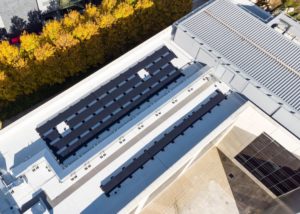I have written previously about why, in my opinion, there is not a single aspect of FM operation, function or service delivery that does not impact on the environment. Whether it be waste management in the supply chain, use of sustainable cleaning products, smart travel plans and reduced vehicle usage, green energy procurement or the removal of single-use plastics from the canteen. As custodians of the built environment, FMs can and do play a pivotal role in driving the sustainability agenda.
In this piece I want to focus more on the impact that strategic FMs can play in the refurbishment and retrofit of commercial buildings, not only to meet net-zero targets but also to create attractive, future-ready spaces that cater to the evolving needs of businesses and their employees.
Of course, commercial buildings are more than mere structures; they are the hubs of innovation, collaboration, and economic development. In the post-pandemic world most, if not all organisations are still evaluating these complex relationships. One other factor to consider however is the significant carbon impact that our commercial buildings have. As the world focuses on achieving net-zero FMs have the opportunity to drive the change. By embracing refurbishment and retrofit projects, we can harness technology and sustainable practices to convert existing buildings into more energy efficient and sustainable environments, aligning them with the net-zero agenda.
An often-quoted statistic in the CRE world is that “80% of buildings in existence today will still be in use by 2050.” meaning that decarbonising this stock will become a major priority. It is worth noting that 25% of UK emissions are directly attributable to the built environment. The UK’s commitment to achieving net-zero emissions by 2050 (2045 in Scotland) is very ambitious as we know. The fact that the majority of our buildings we will be occupying then already exist, underscores the importance of refurbishment, and retrofit.
We know, as strategic FM professionals, we are uniquely positioned to drive this transformation. We possess a profound understanding of how buildings function and operate, from HVAC systems to lighting, from space utilisation to waste management. By leveraging this expertise, we can devise holistic strategies that cut across silos and integrate sustainability into every facet of a building’s operations. Crucially, the need for retrofitting isn’t confined solely to meeting net-zero targets. As businesses adapt to the digital age and embrace flexible work models, commercial spaces will evolve to facilitate collaboration, creativity, and employee well-being. The modern workforce demands environments that inspire, nurture, and accommodate diverse workstyles. Facilities managers can bridge the gap between the architectural legacy of the past and the agile, sustainable spaces of the future.
A successful refurbishment or retrofit project will therefore demand a delicate balance between preserving the integrity of the original structure and integrating cutting-edge solutions. It’s an intricate interplay that requires meticulous planning, innovative thinking, and a deep understanding of both the physical and cultural dynamics of the workplace. With their multidisciplinary skillset FM professionals are uniquely equipped to assist hugely in any such projects.
Embracing this task doesn’t come without its challenges of course. Budget constraints, stakeholder alignment, and the complexities of coordinating a multifaceted project will all present hurdles. However, in the face of adversity lies the opportunity to demonstrate a strategic FM approach. By effectively communicating the long-term benefits of retrofitting, particularly in respect to the environmental agenda, FMs can really support and drive meaningful change.
In conclusion, as the clock ticks towards 2050 the future of our commercial buildings will increasingly rely on the strategic stewardship of FM professionals. Their role in ensuring the refurbishment and retrofit of existing structures to meet net-zero targets is paramount, not only for environmental sustainability but also for creating great workplaces that inspire innovation and accommodate the needs of the future workforce.




